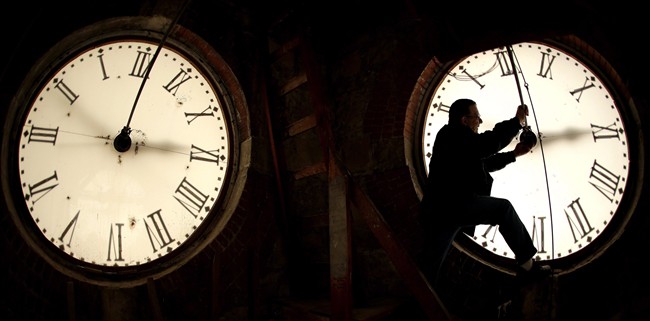TORONTO – It happens every spring: March rolls around and your clock rolls an hour ahead with it. It’s called Daylight Saving Time, and on Sunday morning, at 2 a.m., we’ll spring forward by one hour.

This marks a shift into the spring and summer seasons, our mornings might be darker at first, but in turn we get an extra hour of sunlight just as we’re all heading home from work.
But how does losing just a single hour of sleep tamper with our internal clocks? Global News asked Canadian doctor Colleen Carney about how to make the most of Daylight Saving Time. Carney is a Ryerson University professor, author and head of a Toronto-based sleep lab.
READ MORE: Daylight Saving Time starts this weekend
Global News: We’re setting our clocks ahead by only one hour – is this enough to feel the effects? What do we go through from losing just one hour of sleep?
Carney: An hour is enough to feel the effects. Think of it this way, what if you ate at 6 p.m. most nights but then you crossed over into a different time zone at 6 p.m. and had to wait an extra hour to eat when you are already hungry? You would feel the effect of just this one hour. We have clocks all over our body, including our stomach and we have rhythmicity to things like eating, alertness and sleeping. The spring is particularly tough because we are a sleep-deprived nation and losing an hour of sleep will compound an already difficult situation for some.
READ MORE: Canadian doctor shares her tips for falling asleep and staying asleep
(One UBC professor and sleep expert Dr. Stanley Coren agrees: “We live in a society that is chronically sleep-deprived, and very bad things happen when chronic sleep deprivation is an issue,” he told UBC. He points to research that notes a spike in traffic and workplace accidents in the three days following DST, likely due to sleep deprivation.)
Global News: How long until we’ve readjusted to Daylight Saving Time in our daily schedules?
- Buzz kill? Gen Z less interested in coffee than older Canadians, survey shows
- Naloxone-resistant street drug linked to 9 deaths in Eastern Canada seized in Alberta
- Bird flu risk to humans an ‘enormous concern,’ WHO says. Here’s what to know
- Canada updating sperm donor screening criteria for men who have sex with men
Carney: Most will adjust quickly if they do nothing to compensate. That is, the deprivation will result in an increase in deep sleep the following night and in a day or two you will feel like you did previously. In some extreme cases of deprivation, you may need to nap to make-up for the lost sleep.
READ MORE: Daylight Saving Time leads to ‘massive productivity losses,’ study says
Global News: Is there anything Canadians can do to prepare for the upcoming time change?
For most people, they can tolerate the effects of this one day and bounce back fairly quickly, so nothing needs to change. However, to mitigate the effects, you can take it in chunks rather than one hour if you would prefer. You can start by going to bed 15 minutes earlier tonight and getting up 15 minutes earlier tomorrow, In four days you will already have adjusted.
Global News: Is it worse on our bodies than, say, moving our clocks an hour back when DST ends?
Carney: The spring is the worst because sleep deprivation is worse on our bodies– the adjustment of an hour is no different one way or the other. So spring is always worse and associated with more ill effects but this typically has to do with compounding existing sleep deprivation.
READ MORE: How the end of Daylight Saving Time could affect your schedule, internal clock
Global News: How does our sleeping schedule change from winter to spring and into summer?
Carney: Our sleeping schedule does not necessarily change from winter to summer. My main tip is always to maintain a regular schedule seven days per week and to spend only as much time in bed as you need to sleep. In other words if you regularly produce six hours of sleep and feel restored after six hours, do not spend eight hours in bed, thinking that eight hours is preferable or “normal.”
READ MORE: The necessity of sleep with Dr. Colleen Carney
There is tremendous variability in the sleep needs of adults and needing eight hours is a myth and a source of anxiety for many. If you sleep for eight hours regularly and have to fight to get out of bed and you have to fight off sleeping during the day, you may need a greater sleep opportunity. Spend an extra half an hour in bed to see if you sleep for the extra half an hour and if you feel better. If the answer is yes to both, you are a longer sleeper than just eight hours. People become fixated on a magic number, but our bodies tell us what our current sleep need is.
READ MORE: 4 tips to help kids adjust to Daylight Saving
Global News: Why do we have Daylight Saving Time?
Carney said this issue goes beyond sleep. Coren told UBC that DST came from Benjamin Franklin – he suggested that if work hours were during daylight, people could save money on candle wax, which was costly at the time. It was phased out but reintroduced during WWII. In summary: it saves energy, but it also saves lives as our evenings are lighter for longer periods of time so highways are brighter during the drive home, for example.
“This occurs over a period of months, so although Daylight Saving Time causes an initial hazard, in the end there is a life-saving benefit,” Coren told UBC.
carmen.chai@globalnews.ca






Comments